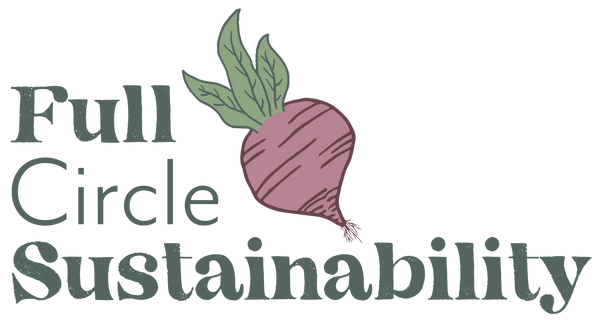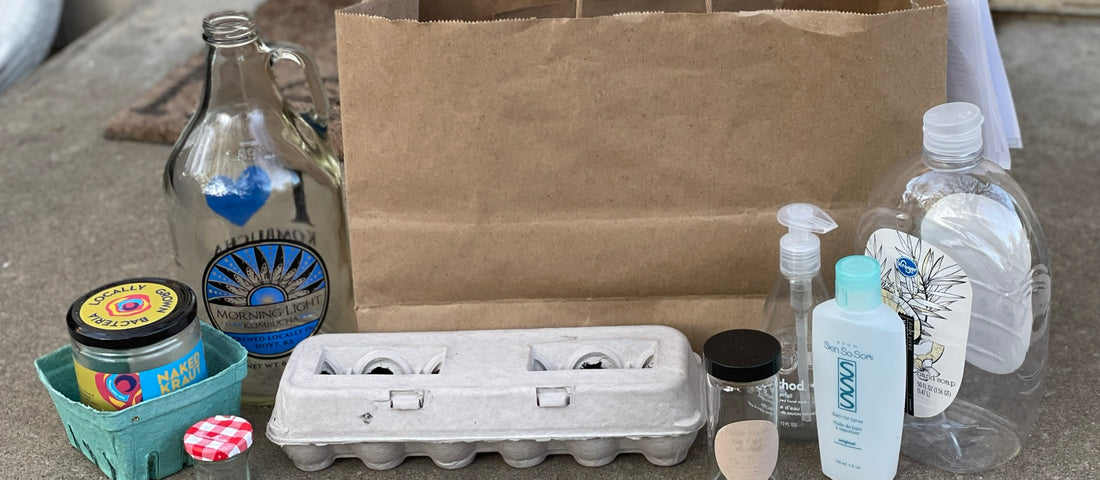Virtually everything we buy comes in packaging of some sort—and one of the key goals of Full Circle Sustainability is to change that. We want to give people the option to buy things with little to no packaging. And when that's not possible (due to state regulations or operational logistics), we want to help you put your packaging to its next best use.
To that end, we've put together a guide for what items we can reuse and what we can't. We love it when you send us back your bags and bottles, and we hope to inspire more of you to do the same—as well as clarify what we can actually use. This list will evolve over time as producers, products, and circumstances change, so check back in the future if you’re not sure.
Thank you again for supporting sustainable systems that strengthen our local community. Acting locally really is key to bringing about global change!
-
Order bags –
We will gladly take back the bag your order was delivered in! Keep your packing label on it so we know it’s yours, and we’ll use it for your future order.
We cannot accept used paper bags with logos on them (from grocery stores, restaurants, etc.). Please avoid accepting these in the first place, but if you do acquire them, you can try taking them back to the place you got them. They can also be recycled or composted.
-
Produce bags –
Unfortunately we cannot reuse these. Give them a second life as trash bags or in any other way you’d use a small bag. You can recycle plastic bags at grocery stores and recycle or compost paper ones. Some of our produce comes in compostable plastic bags, which are labeled as such.
-
Egg cartons –
We’ll gladly take ones from our producers. We are unable to reuse cartons from other producers, but try giving them away to someone who has backyard hens. We’ve had an easy time finding takers at the farmer’s market and by listing them online (Buy Nothing, Facebook Marketplace, etc.). Cardboard cartons can be recycled or composted. Avoid buying eggs packaged in styrofoam or plastic, which are resource-intensive to produce and difficult to dispose of responsibly.
-
Cardboard cartons –
As long as they’re in good condition, we’ll take back the cardboard/pulp cartons that some of our producers use for berries, cherry tomatoes, okra, etc. If they’re not in good shape, you can recycle or compost them.
-
Glass jars –
We can take back glass jars and bottles from any of our producers. We’ll also take small jars (8 oz. or less) to use for packaging hand lotion, deodorant, toothpaste tablets, etc. Please don’t send anything with a residual food smell, and don’t peel off the labels—that just leaves a sticky residue to deal with.
-
Soap bottles –
We’re especially grateful for hand and dish soap bottles; we can always use more of those! We will also take shampoo, body wash, and laundry containers if they are free of scent from the former product. Please thoroughly rinse and dry all bottles before sending them to us. We do wash and sanitize them, but it’s a huge help if you can do the initial rinsing. Also, please don’t peel off labels—that just leaves a sticky residue.
A great option is to have us just refill your own container when you purchase Full Circle products. Find out more about that here, and don’t hesitate to get in touch if you have questions (Justine@FullCircleSustainability.org).
-
Plastic containers –
We are able to reuse clamshells from our producers and honey containers from T Creek Bees, so send those back to us. We unfortunately can’t use any others, so reuse if you can. Recycle if you cannot (#1, 2, and 5 plastic are recyclable in Topeka, though unfortunately clamshells aren't accepted). Throw away if not recyclable.
In the future, we’ll share more tips on how to refuse, reduce, and reuse packaging. In time, we hope to be able to take back more containers for reuse as well. Thanks for working with us to find better solutions to the packaging problem!
-Justine, Full Circle Sustainability

